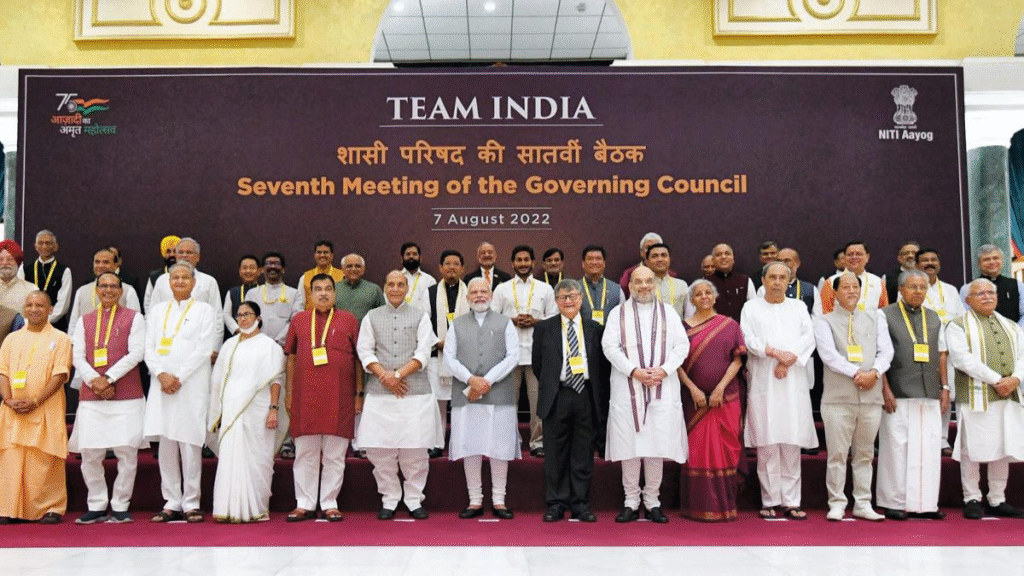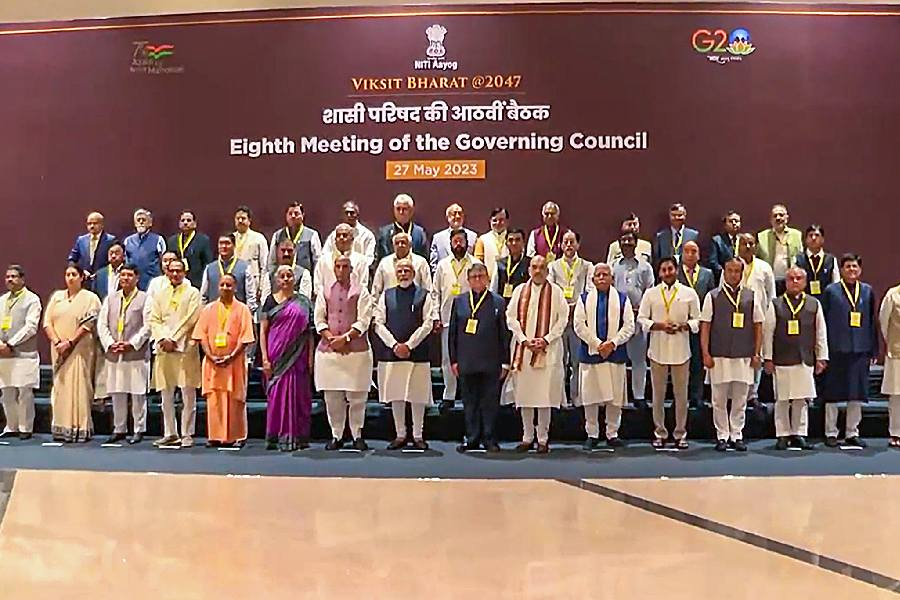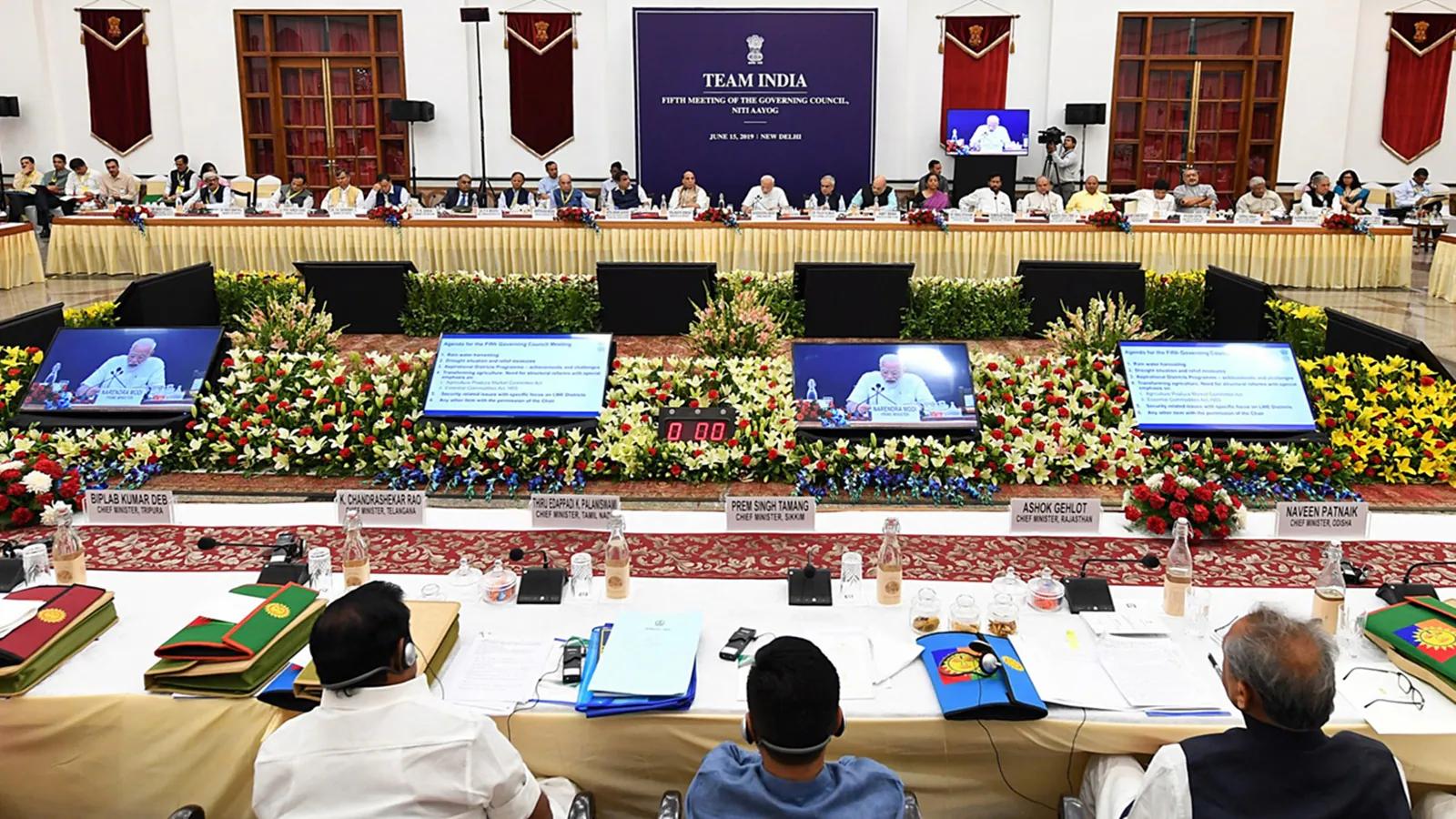
In a refreshing turn of events at the recently held NITI Aayog meeting, Prime Minister Narendra Modi’s warm and engaging interaction with Chief Ministers from opposition parties caught the nation’s attention. From MK Stalin of Tamil Nadu to Revanth Reddy of Telangana and others, the atmosphere was notably cordial, characterized by meaningful discussions, exchanges of ideas, and friendly handshakes. This meeting was more than just a routine governmental summit—it was a powerful demonstration of political maturity and cooperative federalism in action.
NITI Aayog Meet: A Platform for Inclusive Federal Dialogue
The NITI Aayog, established as the premier policy think tank of India, has the crucial task of fostering cooperative federalism by bringing together the central government and state leaders. Each year, the annual meeting becomes a platform where diverse voices converge to discuss India’s development priorities. What stood out this year, however, was the evident shift from mere formalities to genuine engagement. Prime Minister Modi’s personal outreach to opposition Chief Ministers was seen as a significant step toward bridging political divides.
The traditionally formal meetings were infused with moments of informality and warmth, as leaders shared “tea talks” and exchanged pleasantries in a relaxed setting. This demonstrated the Prime Minister’s intent to build trust and collaboration beyond party lines. Leaders such as MK Stalin and Revanth Reddy, who have often been vocal critics, participated actively, reflecting the strength of India’s democratic framework where opposition voices are given space to engage constructively.
From Political Rivalry to Constructive Engagement
India’s political landscape has often been marked by intense rivalry and opposition, but this meeting showed a hopeful shift. PM Modi’s gesture to interact closely and personally with opposition CMs symbolizes an openness to dialogue that transcends political competition. The informal conversations and handshakes conveyed respect and a willingness to focus on the country’s welfare over partisan interests.
MK Stalin, a key figure in southern India’s politics, was seen exchanging views with the Prime Minister, highlighting that regional aspirations and national priorities can find common ground. Similarly, Revanth Reddy, representing Telangana’s political opposition, shared ideas and concerns, underscoring a collaborative spirit. This meeting exemplified that constructive politics is possible when leaders prioritize the nation’s interests.
The Importance of Cooperative Federalism for India’s Growth
India’s diversity, both political and cultural, necessitates a governance model rooted in cooperation. The NITI Aayog’s role as a policy think tank is central to this, encouraging states and the central government to work hand in hand. PM Modi’s interactions with opposition Chief Ministers reinforced the idea that despite ideological differences, development is a shared goal.
The discussions during the meeting spanned critical issues like infrastructure development, social welfare schemes, and economic revival post-pandemic. Such cooperation ensures that policies are not only designed at the central level but also resonate with regional realities. This balance is essential for the inclusive growth of the nation, making the Prime Minister’s outreach both timely and strategic.
Building Trust Through Informal Exchanges
Beyond official speeches and presentations, the informal tea sessions and handshakes between PM Modi and opposition leaders added a human touch to the proceedings. These moments are often overlooked in political analysis but play a crucial role in building interpersonal trust among leaders. By stepping out of formal roles and engaging casually, the leaders demonstrated a readiness to listen and understand each other better.
The optics of these exchanges are powerful in a democracy where media narratives can sometimes amplify divisions. Citizens witnessing their leaders’ camaraderie gain confidence in the political process. It reassures the public that governance can rise above partisan politics and focus on delivering results.
Political Maturity and Democratic Strength
The NITI Aayog meeting set a precedent in Indian politics by showcasing political maturity among leaders from diverse backgrounds. The willingness of opposition Chief Ministers to engage without acrimony and the Prime Minister’s gesture of inclusiveness signal a healthy democracy. This maturity is essential for India’s future as it faces complex challenges requiring united efforts.
The meeting also reminded everyone that democracy thrives on a balance of power—where opposition voices critique constructively and the ruling government responds with openness. Such engagement enriches policymaking and strengthens institutions.
Impact on Public Perception and Governance
The interactions at NITI Aayog have positive implications beyond the immediate political circle. For the average citizen, these engagements represent hope that elected representatives can cooperate for the common good. This can improve trust in democratic institutions, encourage public participation, and foster a more informed electorate.
In governance terms, the collaborative environment allows faster consensus-building on policies and reforms. It can reduce the gridlock often caused by political polarization and help implement schemes more effectively at the grassroots level.
The Road Ahead: Sustaining Dialogue and Cooperation
While the NITI Aayog meeting was a landmark moment, the true test lies in sustaining this spirit of dialogue. Political engagement should not be limited to formal events but must become a continuous process. Regular communication between the central government and opposition-led states can help address issues proactively and enhance policy outcomes.
Prime Minister Modi’s approach sets an example for future leaders on the importance of empathy and openness in politics. It also challenges opposition parties to embrace constructive dialogue without compromising their roles as watchdogs of democracy.
Historical Context: The Evolution of Cooperative Federalism in India
India’s democratic system, since its inception, has relied heavily on cooperative federalism—an approach where the central and state governments work together for national progress. However, political realities often led to confrontations between ruling parties at the center and opposition parties in states.
During earlier decades, these tensions sometimes escalated into distrust and administrative deadlocks, impacting development. Over time, reforms and institutions like the Planning Commission (later replaced by NITI Aayog) were created to encourage dialogue and collaboration.
PM Modi’s recent efforts can be viewed as part of a larger evolution, where political differences are acknowledged but not allowed to hinder governance. The current NITI Aayog meeting’s spirit reflects decades of political maturity and institutional learning.
The Role of NITI Aayog in Shaping India’s Future

NITI Aayog’s vision transcends being a mere advisory body. It aims to be a catalyst for cooperative federalism and innovation in policy implementation. By involving diverse Chief Ministers, including those from opposition parties, it ensures a broad-based approach to challenges like poverty alleviation, infrastructure, health, and education.
The success of such collaboration depends largely on political goodwill. PM Modi’s gesture to personally engage opposition leaders elevates NITI Aayog’s importance as a forum where national unity is celebrated alongside regional diversity.
Challenges Ahead: Balancing Politics and Policy
While the meeting at NITI Aayog showcased political harmony, the underlying realities of India’s multi-party democracy remain complex. Elections, regional aspirations, and ideological differences will continue to shape political behavior. The challenge is ensuring that political competition does not spill over into administrative dysfunction.
In this context, the Prime Minister’s outreach offers a roadmap to balancing robust political debate with the pragmatism needed for governance. Opposition leaders too have a role in moving beyond criticism to constructive participation in policy discussions.
Significance for State-Center Relations
The dynamics between state governments and the central government have a direct bearing on the quality of governance. States with opposition governments often complain of neglect or politicization by the center. The recent meeting challenges this narrative by highlighting inclusive engagement.
Such goodwill can pave the way for smoother cooperation in resource allocation, implementation of schemes, and crisis management, as witnessed during the COVID-19 pandemic. Strong state-center ties ensure that policies are adapted to local contexts, increasing their effectiveness.
Political Optics and Media Narratives
The media’s portrayal of politics often focuses on conflict and controversy, but the NITI Aayog meeting presented a different story—one of respect and dialogue. The optics of PM Modi exchanging handshakes and engaging in tea talks with opposition CMs sends a positive message to the public and international observers.
These images and stories reinforce the idea that Indian democracy is robust, capable of accommodating differences while maintaining unity. This positive narrative is essential for attracting investments, enhancing India’s global standing, and fostering social cohesion.
Public Expectations and Political Responsibility
The success of cooperative federalism hinges on public expectations and political accountability. Citizens expect their leaders to rise above petty politics and deliver tangible results. Meetings like these create an environment where such expectations can be met.
Politicians, aware of the public gaze, are more likely to act responsibly when seen engaging constructively. This can lead to better policymaking, transparent governance, and improved delivery of public services.
The Broader Impact on India’s Political Culture
India’s political culture has often been criticized for divisiveness and polarization. However, the NITI Aayog meet is a reminder that respect and cooperation remain foundational values. By modeling such behavior, political leaders set standards for others in their parties and the bureaucracy.
Over time, such positive cultural shifts can reduce acrimony, increase political stability, and foster a more collaborative spirit among India’s elected representatives. This, in turn, supports long-term nation-building efforts.
Encouraging Regional Voices in National Policy
India’s states are diverse, with distinct languages, cultures, economies, and challenges. Including opposition Chief Ministers in high-level policy discussions ensures that these regional perspectives are not sidelined. It promotes equity in policy formulation and implementation.
PM Modi’s inclusive approach reinforces the principle that India’s unity is enriched by its diversity. By bringing regional leaders to the table, NITI Aayog exemplifies democratic pluralism in action.
Conclusion: Towards a New Era of Political Collaboration and National Progress
The warm and meaningful interactions between Prime Minister Narendra Modi and opposition Chief Ministers at the NITI Aayog meeting mark a watershed moment in Indian politics. It reflects a collective commitment to cooperative federalism, democratic maturity, and inclusive governance.
As India stands at the cusp of major developmental and geopolitical challenges, the ability of its leaders to work together across party lines will determine the nation’s future trajectory. The NITI Aayog meet serves as an inspiring example of how dialogue, respect, and collaboration can overcome differences for the greater good.
This new chapter promises not only better policymaking but also renewed faith among citizens in their democratic institutions. It is a hopeful vision for India’s political culture and a testament to the enduring strength of its democracy.

